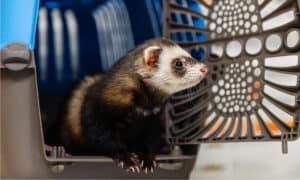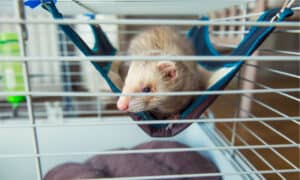| Best for | Product |
|---|---|
| Best Overall | Marshall Premium Ferret Food |
| Best on a Budget | Kaytee Forti-Diet Pro Health Ferret Food |
| Best for Flavor | Marshall Select Chicken Formula Ferret Food |
| Best Grain-Free Food | ZuPreem Grain-Free Diet Ferret Food |
Ferrets, just like every other animal, need a healthy and nutritious diet. Whether you’re a seasoned ferret parent or you’re researching before adopting, you’re in the right place. It can be confusing with all of the pet food options online and in pet stores today.
We’ve done the research for you and found the top ferret foods that your furry friend will enjoy. Although these cute and playful critters hunt rabbits in the wild they usually only eat dry kibble when domesticated.
Below you’ll find out favorite options that are packed with all of the nutrients your ferret will need. We answer popular frequently asked questions, along with going over a buyer’s guide in detail to ensure you choose the right option that’s best for your pet.
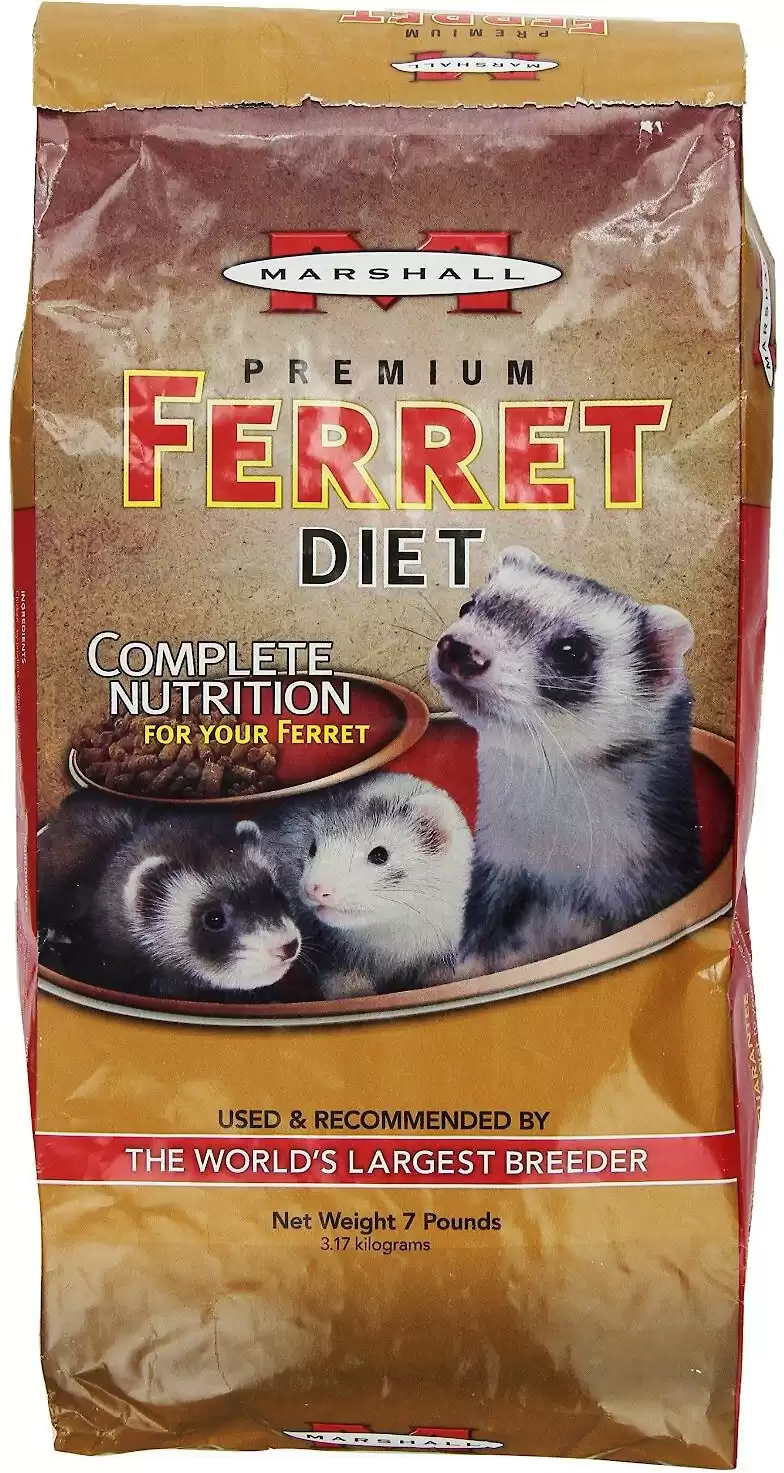 Check Chewy Check Amazon
Check Chewy Check Amazon- Contain at least 38% protein
- Comes in different size packaging
- Vitamin and fat-enriched
- Very tasty and nutritious
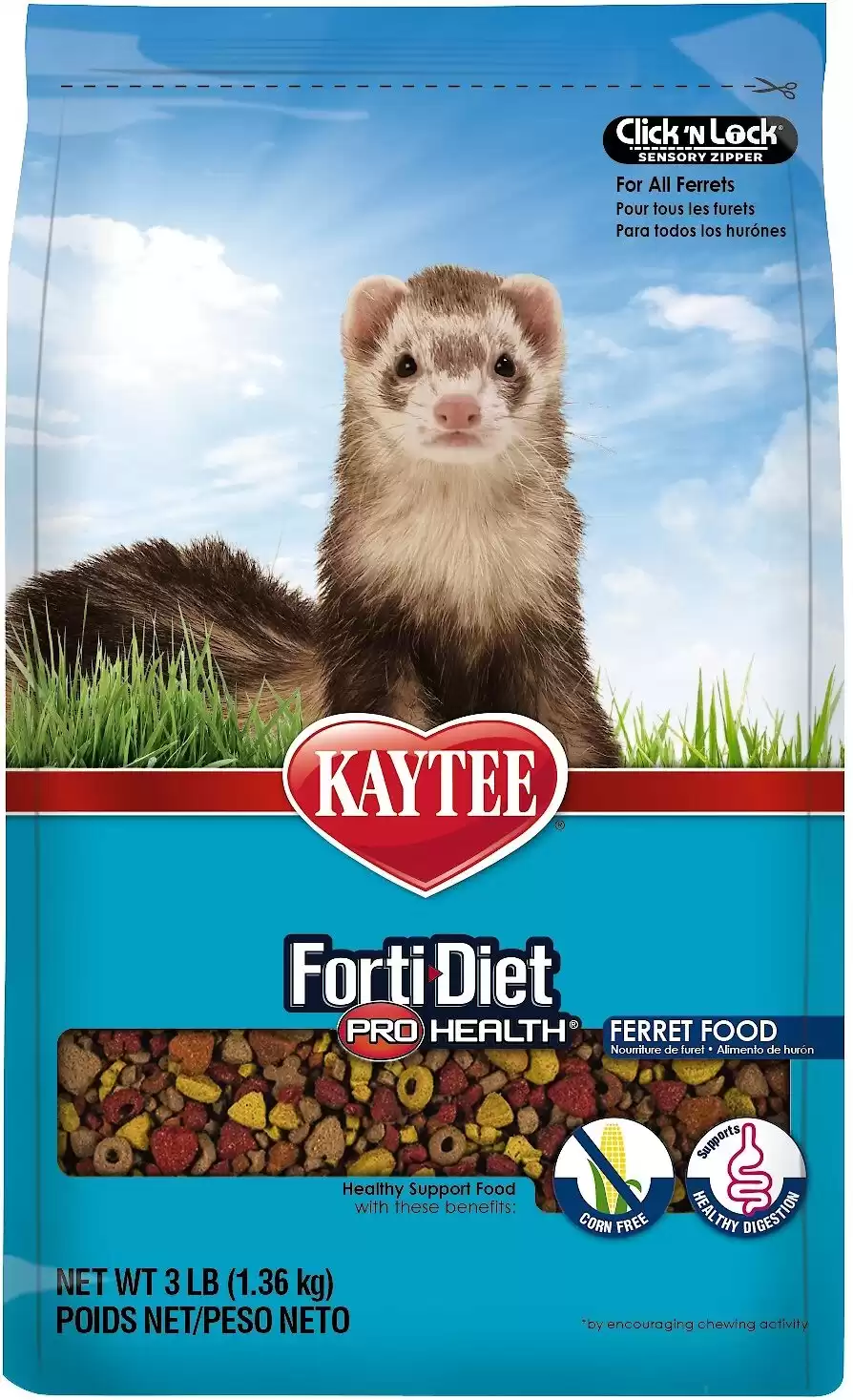 Check Chewy
Check Chewy- Available at an affordable price
- High in protein and crude fat
- Added probiotics and omega-3 fatty acids
- Ferrets really love this
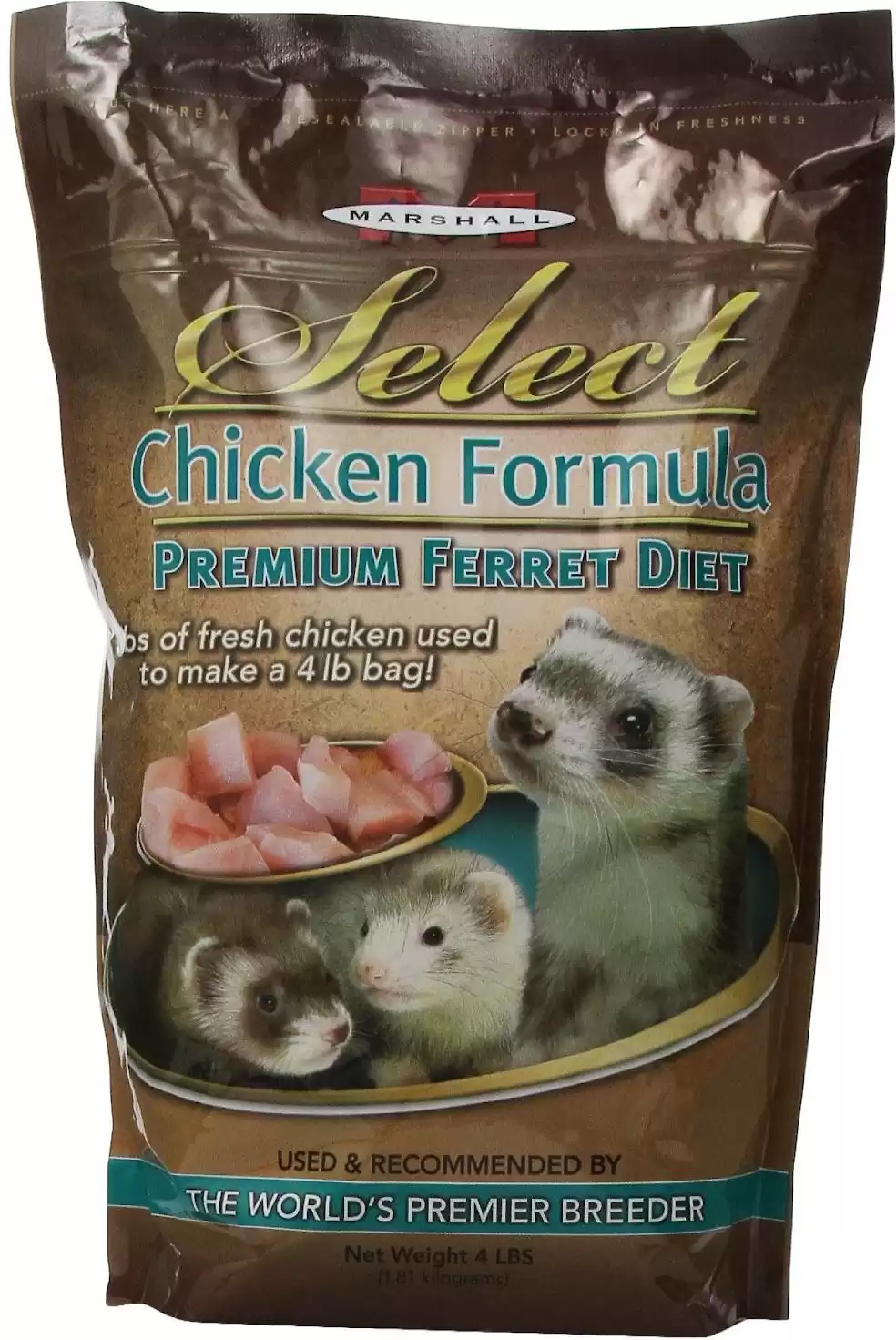 Check Chewy Check Amazon
Check Chewy Check Amazon- Chicken is the first ingredient
- Food is soft and breaks when touched
- Easy to eat
- Very nutritious
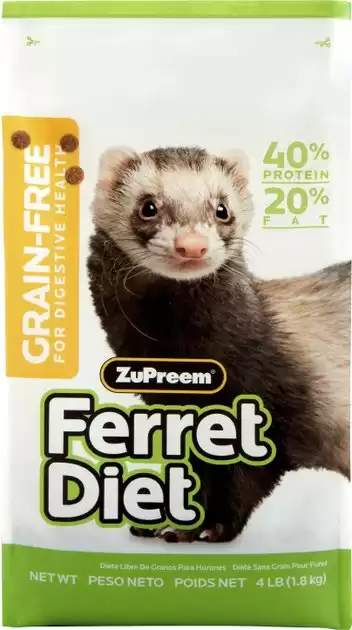 Check Chewy
Check Chewy- Grain-free
- Contains chicken meal and sweet potatoes
- Gives the ferret everything it needs
- Great option for sensitive ferrets
A-Z-Animals Top Picks for Ferret Food
#1 Best Overall: Marshall Premium Ferret Food
Our overall best choice for ferret food is the Marshall Premium Ferret Food.
As ferrets require a lot of protein this food contains at least 38% crude protein. You’ll also find a minimum of 18% crude fat which gives your ferret the essential building blocks he or she needs to be healthy. This mix is enhanced with vitamins and minerals to guarantee that your ferrets get all of the nourishment they require. It also contains omega-3 and omega-6 fatty acids to promote skin and coat health.
This meal is perfect for ferrets that are at least six weeks old. Plus, if you’re offering it to younger ferrets who don’t yet have all of their teeth, you can make a paste out of it by mixing it with water.
This kibble is available in small and big packages ranging from seven pounds to 35 pounds for your convenience. Be aware that it is a bit pricey for the quantity, and you may be able to purchase similar food for less money, albeit the quality may be lacking.
Pros and Cons of the Marshall Premium Ferret Food
| Pros | Cons |
|---|---|
| This food contains 38% crude protein and 18% crude fat. | It is more expensive than some other food options. |
| It is enhanced with vitamins and minerals to promote all-round good health. | |
| It contains omega-3 and omega-6 fatty acids to promote a healthy skin and coat. | |
| It is suitable for ferrets aged six weeks and older. | |
| This food can be made into a paste with water for young ferrets. |
- Contain at least 38% protein
- Comes in different size packaging
- Vitamin and fat-enriched
- Very tasty and nutritious
2. Best on a Budget: Kaytee Forti-Diet Pro Health Ferret Food
The Kaytee Forti-Diet Pro Health Ferret Food could possibly be the best ferret food for pet parents on a budget.
This food contains a minimum of 35% crude protein. It’s also high in crude fat (20%), giving your ferrets lots of nourishment. Of course, there’s more to nutrition than fat and protein. As a result, probiotics and omega-3 fatty acids are included in this food. This is something you won’t find in every kibble on the market, but they’ll keep your ferrets’ coats smooth and luscious while also supplying nutrition for digestive, cardiovascular, eye, and brain wellness. It is also free from artificial colors and flavors.
The fact that this food is only available in a three-pound bag is our main gripe with it. If you only have one ferret, this could be plenty for a while. However, if you have a lot of furry friends, anticipate ordering more nearly as soon as they arrive!
Pros and Cons of the Kaytee Forti-Diet Pro Health Ferret Food
| Pros | Cons |
|---|---|
| This food contains a minimum of 35% crude protein and 20% crude fat. | It is only available in a small bag size. |
| It contains probiotics and omega-3 fatty acid to promote a healthy skin and coat, as well as supporting the digestive and cardiovascular systems. | |
| It does not contain any artificial colors or flavors. |
- Available at an affordable price
- High in protein and crude fat
- Added probiotics and omega-3 fatty acids
- Ferrets really love this
3. Best for Flavor: Marshall Select Chicken Formula Ferret Food
In our opinion the food with the flavor that your ferret will love the most is the Marshall Select Chicken Formula Ferret Food.
The food lists chicken as the first ingredient, indicating that it is the most used ingredient in the mixture. You may also count on at least 36% crude protein, guaranteeing that your ferrets get enough meat. It’s also enhanced with numerous vitamins and minerals to ensure that your ferret maintains only the very best heath. Plus, it contains taurine which is essential for a healthy heart.
Each bag is made with around three pounds of fresh chicken. Not only is this healthy for your pet, but they’re also sure to love the taste as well. It can be hard to find a food that your ferret enjoys, and we think this will be a sure winner!
Hard food might be tough for some ferrets. Some appear to despise them. This ferret chow, on the other hand, is considerably softer and breaks when touched. This makes it extremely easy for them to consume. However, it can also be mixed with water to make it even softer and more palatable for young ferrets.
Unfortunately, this food is quite expensive for the bag size. Also, some customers reported that their ferrets would not eat it.
Pros and Cons of the Marshall Select Chicken Formula Ferret Food
| Pros | Cons |
|---|---|
| This food features chicken as the first ingredient. | It is an expensive option. |
| It contains 36% crude protein. | Not all ferrets like this food. |
| This food features soft kibble that is easy to chew. | |
| It can be mixed with water to feed to young ferrets. | |
| It is enhanced with vitamins and minerals. | |
| It contains taurine to promote a healthy heart. |
- Chicken is the first ingredient
- Food is soft and breaks when touched
- Easy to eat
- Very nutritious
4. Best Grain-Free Food: ZuPreem Grain-Free Diet Ferret Food
If your pet requires a grain-free diet then we recommend the ZuPreem Grain-Free Diet Ferret Food.
This food is jam-packed with probiotics for better gut health, but that’s only one of the advantages it can offer your pets. You’ll also love that it has at least 40% crude protein and 20% crude fat. It also contains numerous vitamins and minerals to promote good health in your pet.
This food is available in a convenient four-pound bag. It’s designed to be a major food source that gives your pet ferret everything he or she needs to live a healthy life. Ferrets have a particular digestive system that necessitates a certain protein-to-animal-fat ratio to maintain their busy lives and this food meets their needs.
This food is completely grain-free and it’s a great option for ferrets that have sensitivity to gluten or perhaps have a medical condition, such as irritable bowel syndrome.
The only drawback to this food is that some ferrets do not like it.
Pros and Cons of the ZuPreem Grain-Free Diet Ferret Food
| Pros | Cons |
|---|---|
| This food contains 40% protein and 20% fat. | Not all ferrets like this food. |
| It contains prebiotics to promote gut health. | |
| It is enhanced with vitamins and minerals. | |
| It is completely grain free. |
- Grain-free
- Contains chicken meal and sweet potatoes
- Gives the ferret everything it needs
- Great option for sensitive ferrets
What Are the Dietary Requirements of Ferrets?
Ferrets require regular small meals due to their fast metabolism and short digestive tract. On any given day, most ferrets will consume around 10 small meals of standard pellet food. Because of their frequent feedings, it’s ideal to have a supply of food on hand at all times.
Ferrets are carnivorous predators. Their diet should consist mostly of animal-based proteins, with no plant-based ingredients. Some fruits, such as grapes are harmful to these hairy little animals. Their food should also contain 30 to 40% protein and 20 to 30% fat. It should also be low on carbohydrates and low on fiber.
Choosing the Best: What to Look For
Now that you’ve seen a variety of ferret meals, how do you choose the best one? At first look, all of these ferret meals may appear to be the same. However, if you look closely, you’ll find that there are some significant differences between them. In this brief buyer’s guide, we’ll go over the most crucial factors to consider to make your selection easier.
Protein Content
Ferrets are obligate carnivores, meaning they get all of their food from animals. As a result, protein is their most valuable commodity. They require an abundance of protein in their diet — typically between 30 and 40%.
Fat Content
Fat is the other major nutrient obtained by ferrets from animal-based meals. They require a large amount of it because it is their primary source of energy rather than carbs. To guarantee that your animals get enough fat, look for a meal that has at least 15% crude fat.
Carbohydrates
Carbohydrates are detrimental to your ferret’s health. Carbs are not required for ferrets. Their digestive systems are incapable of processing these nutrients. As a result, you should opt for ferret feed with the least amount of carbs. Use caution when seeing phrases like grain-free. There are carbs that aren’t grains, so this doesn’t mean they’re carbohydrate-free.
Ingredients
Reading the ingredients list is one technique to rapidly assess the quality of any ferret food. They’ll be presented in order of highest to lowest quantity, therefore the first item on the list will be the most common in the mix. Look for meals like chicken that include entire animal origins as the first ingredient.
The Different Types of Ferret Food: Pros and Cons Compared
The only ferret food that you see in stores that you should give your furry friend should be dry food. Please avoid any wet food you see in stores. In addition, you can give your ferret any of the following as part of their diet.
- Pelleted food: This is perfect for feeding ferrets because it is dry and easy to store. Kibble is a nice example of this. They’re available at various pet retailers. Everything we’ve mentioned above is considered pelleted food.
- Cooked meat: Beef, pig, turkey, and other meats. Cook them briefly and provide them to your ferret plain as can be. Do not use any spices or add any condiments to the meat.
- Raw egg yolks: Eggs are an excellent meal to include in a ferret’s diet since they’re strong in protein, fat, and energy while also being low in carbohydrates. Egg yolks can be fed directly to them in a bowl or used in a dish.
- Vitamin and mineral supplements: When wild ferrets devour other creatures, they consume the flesh, bones, and fur, which provides them with a more complete diet than just cooked meat. To balance their diet, feed them vitamins along with cooked meat on a regular basis.
Foods to Avoid
What should you never give your ferret? Here are a handful of food items to avoid feeding your adventurous companion.
- Grains: Ferrets cannot digest fibrous foods, so stay away from them! Rice, oats, bread, and other grains should be avoided by ferrets.
- Junk foods: Many junk foods are heavy in sugar and starch, which can create difficulties for ferrets, and some are potentially poisonous, such as chocolate. So stay away from chocolate, snack foods, fried food, ice cream, wine, tea, cakes, pizza, and other similar foods.
- Dairy: Ferrets are lactose intolerant and cannot consume dairy products.
- Dog food: This is worth mentioning since, either to misconception or laziness, some pet owners may be tempted to give their ferrets any other animal’s food. However, ferrets have quite different dietary demands than other pets, including dogs, and this should be avoided.
- Fruits and vegetables: Ferrets are unable to digest plant-based foods because they are lacking the cecum, a digestive organ. Vegetables are discouraged, and supplements or pellets should provide the majority of a ferret’s non-protein and fat intake. Fruits are a no-no since they include both sugar and fiber.
Best Times to Feed Your Ferret
The majority of living creatures have a set eating pattern. This includes our pets, such as dogs and cats. Ferrets, on the other hand, are exempt from this rule. It is a well-known truth that they require four meals in a 24-hour period, however, a strict eating plan in their feeding pattern is rarely observed. To put it another way, they control their own eating schedule.
Due to their fast metabolism, ferrets should be fed dry food that has at least 30% protein. The most notable aspect of ferrets’ eating habits is their high absorption capacity. Food goes through their intestines rapidly due to the low bacteria concentration. Veterinarians estimate that absorption takes three hours.
That effectively implies they must eat every six hours or less. Due to ferrets’ erratic eating schedules, it is critical that you have a supply of your pet’s food on hand. They may feel hungry at inconvenient times. Ferrets have been observed transporting little bits of their feed to their cage in anticipation of their next meal.
These stashes, however, must be cleaned out on a regular basis since they will deteriorate if left unchecked. The feeding regimen of a kit must be carefully monitored. They do not drink from a bowl until they are around four weeks old, therefore they must be fed by hand until then. It is also necessary to feed them often, say every two to three hours, a minimum of four times a day.
Up Next
- How to Choose the Best Ferret Cage — Find the perfect cage for your ferret here.
- These are the Best Ferret Toys for Your Pet — Are you looking for new toys for your ferret? Look no further as we’ve got plenty for you to choose from here.
- These are the Ferret Carriers You’ll Actually Want to Use — Planning a trip? Take a look at these ferret carriers!
| Best for | Product |
|---|---|
| Best Overall | Marshall Premium Ferret Food |
| Best on a Budget | Kaytee Forti-Diet Pro Health Ferret Food |
| Best for Flavor | Marshall Select Chicken Formula Ferret Food |
| Best Grain-Free Food | ZuPreem Grain-Free Diet Ferret Food |
The Best Ferret Food for Happy, Healthy Pets FAQs (Frequently Asked Questions)
Is it OK to feed ferrets cat food?
Ferrets may now consume cat food, but it must be a kitten meal with a high protein level and low carbohydrate content. If you can discover food made expressly for ferrets, it will always be the greatest choice for your fluffy ferret pal.
Can ferrets drink milk?
Ferrets are also poisoned by milk, yogurt, cheese, and other dairy products. Choose something different to be safe.
Do ferrets need salt licks?
Please don’t give ferrets any salt licks. Ferrets do not need them, and having them is neither healthy nor encouraged.
Can I give my ferret scrambled eggs?
Eggs provide a very healthy quantity of protein and fat, both of which your ferret needs, as well as critical vitamins when thoroughly cooked. One to two cooked eggs every week is a terrific supplement to your ferret’s diet, and they’ll almost certainly enjoy it!
Should I wet my ferrets food?
Avoid giving your ferret moist food since it is bad for their teeth. Ferret food that is dry and pelleted is an excellent choice.
Thank you for reading! Have some feedback for us? Contact the AZ Animals editorial team.

